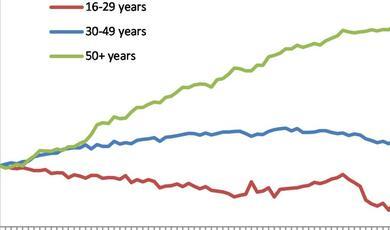If at first you don’t succeed, then what?
Share
- Details
- Transcript
- Audio
- Downloads
- Extra Reading
One of the most important decisions we may ever need to make is whether to continue investing time and money in a decision that is not turning out as expected. This lecture explores what drives us to persist despite poor odds and how, as a result, we can end up 'throwing good money after bad'. Helga Drummond is Professor of Decision Sciences at the University of Liverpool Management School. Her latest book, How to be a Successful Entrepreneur, is published by Kogan Page.
Download Transcript
If at first you don't succeed, then what?
Professor Helga Drummond
University of Liverpool
Good afternoon everyone. I want to begin by reading a short story. The story that takes us back to 1961 when something remarkable happened in the Libyan Desert. Eight years earlier in 1953 an obscure entrepreneur name Bunker Hunt applied for a drilling licence. The prospects seemed exciting, as geologists advised Hunt that an oil field recently discovered in Algeria would almost certainly extend into Libya. Unfortunately for Hunt the so called 'Seven Sisters' (multi-national oil companies) were already drilling the best sites. The only concession available to Hunt was so remote from the Algerian border, offering such miserable prospects that even the customary bribe to local officials was waived. Bunker might have given up there and then but as a gambler he believed that the more cards he could draw on, the better his chances, even if they were cards everyone else scorned.
Hunt drilled for years and found nothing. Yet despite their markedly better chances, the 'Seven Sisters' did no better. Eventually, one of the 'Sisters' British Petroleum (BP) gave up and went into partnership with Hunt:
The deal did not at first change Bunker's luck. In 1961 BP's experienced drilling teams struck out into the desert and drilled one well in Block 65. They reported that it was dry. So was the second well, and the third. (Fay 1982: 6)
The rig superintendent was instructed by BP to stop drilling and return home. Technically, that decision was correct because geologists have learned that the prospect of finding oil decreases with the number of dry wells struck. In other words, the longer you go on drilling, the less likely you are to strike oil. Imagine: it was the final shattering blow for Hunt who had invested all his money in the venture:
Then, just for luck, the rig superintendent drilled another ten feet into the sand before withdrawing the bit from the third hole, and, in doing so, uncovered Bunker's ace. That ten feet was enough to pierce the cap of one of the world's largest oil fields. (Fay 1982:7)
We will probably never know what intuition prompted the foreman to drill down just another ten feet. Yet supposing that move had proved abortive. He might well have been tempted to drill down another ten feet, and then another - only to end up 'throwing good money after bad' - a phenomenon known as escalation of commitment.
Escalation of Commitment
We know a lot more about how to get people and organizations moving than we do about how to stop them if they start moving in the wrong direction. Business and political history is full of examples of ill-judged decisions that should have been stopped sooner rather than later or not embarked upon at all. In January 2004 Deloitte's began suing the Bank of England for £850 million for alleged dishonesty over it supervision of BCCI. Although informed observers said from the start that the case was hopeless, Deloitte's persisted for almost two years at a cost of £40 million before conceding defeat - prompting the Bank of England to claim £60 million in costs. More recently, Woolworth's carried on selling their traditional lines like 'pick and mix' despite mounting evidence that the business model had outlived its usefulness. The £12 billion NHS electronic patient record system is now over four years late. It is so far behind schedule that it seems destined never to appear. Almost every week someone from the armed forces is killed in Afghanistan. What is keeping us there?
You may have experienced escalation in your own lives; being stuck 'on hold' on the telephone; forever repairing a car that has become a liability, hanging on to non-performing investments, pouring emotional energy into a relationship that has no future. When you finally give up, the first question you ask yourself, is why didn't you quit long ago?
Why indeed? Just about all decisions involving uncertainty run the risk of failure. When it becomes obvious that a decision is not turning out as expected, we may have to decide whether to quit or continue. Now economics teaches that we should only continue if the benefits are likely to outweigh the costs. Yet research by behavioural scientists has shown that we may be tempted to re-invest despite hopeless odds, and end up become trapped in a spiral of escalating commitment, investing more and more resources as things go from bad to worse.
Psychological Causes of Escalation
That doesn't answer the question of why individuals and organizations behave in such a destructive manner. Behavioural scientists believe that a powerful escalation driver is our innate need as human beings to protect our egos. Ego defensiveness can manifest itself in all sorts of ways. For instance, research has shown that supervisors tend to give higher performance ratings to employees they have personally chosen than staff they inherit. It's as if they unconsciously say to themselves, 'I chose them so they must be good.'
Experiments into consumer behaviour have also shown that people who pay even just a token sum for say a sample of paint typically express greater satisfaction with the paint than those who get the sample free. Even though the amount of money involved is trivial, it is still important for us to feel that we have made the 'right' decision.
Myopia
If it was obvious from day one, that the case was hopeless why didn't Deloitte's see it? In order to make decisions we have to simplify. Simplification means that we attend to parts of our information whilst filtering out the rest. The trouble is feedback usually contains a mixture of good and bad. When our ego is at stake we may unconsciously pay more attention to information that seems to support our pre-conceived notions whilst downplaying or even ignoring potentially ominous feedback. So whereas an objective bystander can see persistence is hopeless, decision-makers who are emotionally involved in a venture, (particularly if their careers are at stake), may genuinely believe that they can succeed.
For instance, the NHS electronic patient record system caused chaos during its first trial run. That kind of feedback is ominous because it suggests that even if the project is finally completed it may not work as intended, or, might never even work at all. Blaming third parties for the fiasco, perhaps saying that the trial was badly managed, that line managers had failed to brief staff properly and so on only makes things worse because it is tantamount to denial.
The 'Dollar Auction'
I want to pause now and offer this £1 coin for auction. There is no reserve price so it could be yours for as little as one penny! There is just one condition, however. The second highest bidder must pay the bid price and they get nothing. Bear in mind though, if no one else bids it's yours for a penny - pretty good investment!
[Run auction: all proceeds to Gresham college.]
When I run the auction with students it is not unusual for the coin to fetch bids of £4 50 and £3 50 as second highest bids - and that's just with impecunious undergraduates. With a group of MBA students I once sold a battered text book worth barely £5 for £90 - with £70 as second highest bid.
The point is, decisions are often made in the public arena and the auction is a good way of illustrating how escalation can be driven by the presence of an audience. Most students join the auction just for fun and they soon drop out. Yet inevitably two students become locked into a mutually destructive competition as the bid price rises above the face value of the coin. In the auction students seem to become swept up in displays of bravado, a desire to show off in front of others though I wonder how they feel about their expensive purchases afterwards - especially the second highest bidders who must endure the ignominy of paying up and being seen to fail. The point is, how many supermarket and airline price wars, for example, have been driven by a similar dynamic?
Bidding in the 'dollar auction' may ultimately be driven by a desire for revenge. When someone makes us look foolish, for example, by consistently out-bidding us, they damage our esteem. Eastern philosophy I believe advises those bent on revenge to dig two graves, one for their victim and the other for themselves. Although revenge can be ruinously expensive, that seldom stops people from exacting it. Revenge is sweet. It is sweet because it restores our self-esteem.
The US Federal reserve's refusal to rescue Lehman's precipitated the global banking crisis.
The decision has been criticised by some commentators as the worst mistake in US financial
history. Yet the 'Fed' had already seen fit to rescue other banks like Fannie Mae and Freddie
Mac and would subsequently bail out many more. Might history have been different if
Richard Fuld Lehman's CEO, had not goaded Hank Paulson US treasury secretary at a dinner
a few months before the crisis broke?
Escalation can also be driven by socially instilled norms to be consistent, and to finish what we have started. The proverb too, tells us that if a first we don't succeed, try, try again. Margaret Thatcher is an example of how decision-makers can become victims of their own persona. She may not have said, "Serfs yea are, and serfs yea shall remain!" as did soon to be deposed king Richard II when faced down poll tax protestors. When Margaret Thatcher, revived the idea, she too met with rebellion. It was not the poll tax itself that doomed her premiership, but her intransigence having become locked in to her persona of 'no turning back'.
'Waste Not: Want Not'?
Imagine that you have two frozen meals in your refrigerator. Both have reached their 'eat by' date. The meals are identical except that one cost £8 99 and the other was bought on a special offer for £4 99. You can only eat one meal. Now choose.
Logically it makes no difference but when behavioural scientists did the experiment they found that some people opted to eat the more expensive meal because it seemed less wasteful.
Research has consistently shown that we are waste averse, even if waste actually makes economic sense. For example, some people will buy single tickets for entry into amusement parks because they cannot use the whole block of tickets even though it would be cheaper to buy the block and waste a few tickets!
Exiting unsuccessful decisions is inevitably wasteful. In the late 1970's journalists dubbed the miles and miles of abandoned pipe works of Chicago's sewer system 'money down the drain'. Can you imagine the outcry if the government decided to abandon the NHS computer system - all that money wasted?!
Yet past investments - or sunk costs as they are often called, should be normally be ignored when deciding whether or not to persist with a decision, because they cannot influence future outcomes. They are dead money. For instance, if you buy non-refundable theatre tickets and the play subsequently gets bad reviews, you may feel you ought to go just to get your money's worth. Yet what you paid for tickets is irrelevant. If you then go and sit through a tedious play, you waste an evening and end up compounding the misery. It is better to ignore the money and spend the evening doing something interesting.
Yet sunk costs are not always sunk psychologically. Research has shown that, broadly speaking, the more we have invested in something, the more likely we are to continue even though continuance defies economic logic. Here is a Mont Blanc fountain pen. The cost to buy is £455. I have seen second-hand Mont Blanc's fetch £370 on E-Bay. You might think that with all the risks involved, (like forgeries, and damaged nibs) that bidders would rather pay a bit more for a new one. Significantly, a study of bidding on E Bay found that the best way to get a high price on for an item is to dispense with reserve prices and start from a low bid. Early bidders tend to persist regardless of price - presumably because they have invested so much effort in the auction that they want to see results. If you are a seller it is a risky strategy but a potentially rewarding one! Research has also shown that entrepreneurs are more likely to sell businesses they have bought than businesses they started for themselveseven though their own start-ups are performing relatively poorly - presumably because of all the extra time and effort invested.
Incidentally, economics teaches that we should change direction if an investment opportunity offering a better return becomes available, even ifit means abandoning a successful venture. For instance, Tullow oil abandoned ventures in the North Sea and elsewhere and wrote of millions of pounds of investment in order to pursue potentially more profitable possibilities in Ghana and Uganda.
Risk Seeking Behaviour
We can only do that if we are willing to accept a loss. Imagine a day at the races. You have lost £95 on unsuccessful bets. You have just £5 left. Do you bet on the favourite running at 3 to 1; or, on a 'long shot' running at 20 to 1?
If you bet on the favourite you might emerge with a small sum. Bet on the 'long shot' and you will probably depart empty handed. Yet many of us would be attracted to the 'long shot' because we see it as a chance of recouping the lost £95. Psychologists call it risk-seeking behaviour. To be risk-seeking is to take a bigger risk than objective conditions warrant. We tend to become risk seeking when we define decisions as a choice between losses. That is, we would rather avoid a definite loss, (like the £95), even though we risk subsequently incurring a bigger loss (£100), by betting on a 'long shot'.
Risk seeking behaviour may be one reason why accountants Arthur Andersen were dragged down by Enron's collapse. In year one, Andersen may simply have stretched a point regarding manipulation of the accounts to inflate income. In year two they may have made a few more concessions and so on. Every concession made it progressively harder to stop because of the loss of credibility that would definitely ensue by 'whistle-blowing'. Risk seeking behaviour also explains why rogue traders like Nick Leeson are dangerous. It's called 'trader's option'. Traders reach a point where confessing to losses or misdeeds is bound to result in the sack - so they have nothing to lose by attempting to gamble their way out of the mess.
Escalation and 'Long Haul' Projects: The March of Folly
Big, 'long haul' projects are particularly prone to escalation. Since time equals risk, there is plenty to go wrong and there may be no revenues to offset additional costs until the project is completed. Escalation often starts with bright promises that gradually unravel. Costs and timescales get pared down; revenues get scaled up until the project looks viable. For instance, the prospectus for the Channel Tunnel promised easy construction, and, suggested that even if something did go wrong, there would be huge revenues to compensate for cost over-runs. As we now know, those promises were not fulfilled.
Time changes everything. Part of the problem with defence procurement is the long lead time. To-day's equipment needs were planned during the Cold War and Northern Ireland era. By the time the NHS patient record system is implemented, if it is ever implemented, it may well be largely redundant as health trusts are increasingly building their own systems.
The 2012 London Olympics are allegedly overspent by £159 million on land acquisitions alone. Once big projects like this get underway, whole organizations are set-up to support them. Outsiders invest massively - so the pressure is to continue regardless of spiralling costs.
In business and particularly in government, many ill-judged decisions are ultimately driven by politics. It is easier not to rock the boat. US presidential advisor Arthur Schlesinger kept quiet about his reservations about invading Cuba in 1961 - a decision that led to the Bay of Pigs fiasco. He said afterwards that his feelings of guilt were tempered by the knowledge objection would have accomplished little except to become seen as a nuisance. Dean Rusk too had an interesting mantra for political survival in times of high uncertainty when he spoke of forever playing a mediocre hand rather than risk all for a better one.
The Rags of Time: Entrapment
There is another form of escalation known as entrapment. Entrapment is where 'lock-in' happens, not so much because of clear decisions to re-invest in a questionable course of action, but more as a result of the simple passage of time. To be more precise, time itself becomes an investment. For instance, the longer we wait for a bus to take us to the railway station, the less it makes sense to walk. Eventually we reach a point where, having waited for so long, our only hope of catching the train is to continue waiting for the bus.
Continuity begets continuity. I see entrapment a lot in small businesses. What tends to happen is that the cost of not changing direction is initially so small as to be invisible. It is only over time that the cost of not stocking new lines, offering credit card facilities and smartening the place up becomes apparent as owners who fail to keep up with the times gradually lose market share. Turnover gradually diminishes until the business reaches a point of 'no return' where there are no funds for investment as there is barely enough money to support the owner. Then it is usually only a matter of time before the business goes under.
Although escalation captures the headlines, entrapment may actually be more invidious precisely because it happens passively. For example, experiments have shown that people tend to invest more in a poorly performing venture if re-investment occurs automatically unless they intervene to stop it, than if the decision must be made actively. The risks of escalation are thought to be heightened if nothing happens to force decision-makers to confront their options.
Another reason for entrapment is what are known as 'side-bets'. Side bets are the incidental elements that are initially irrelevant to the decision to embark upon a course of action. Eventually those 'side-bets' can become the major reason for persistence. For example, the longer we stay in an organization the more benefits we may come to enjoy that count for nothing we leave. So quitting just becomes too expensive. Side-bets are what we call 'decision-less decisions'. For instance, people may become self-employed not because they particularly want to be self-employed but because they cannot get into university or because they have been made redundant. Over time they find that they get hooked on the freedom and cachet of self-employment - originally just a 'side-bet' and just cannot give it up even though they end up working for less than the legal minimum wage.
Danger may also lurk in the 'taken for granted' organizational routines. During the Cuban Missile Crisis of 1962, President Kennedy's worst fear was that a nuclear holocaust would be triggered not by American or Russian heads of state taking a grave decision to act, but by a relatively lowly employee responding routinely to some pre-programmed event. Barings learned this to their cost. For all that has been said greed and incompetence, the immediate cause of Barings' collapse was the relentless flow of millions of pounds of collateral (margin) out of London into Simex in Singapore to support Leeson's trading.
These margin calls were triggered automatically, faxed to London and paid automatically. In the last days of the bank's existence, Barings had over £500 million in margin posted. Since Barings only had £450 million, that was a precarious position yet senior management did not realise how much was actually at stake. Of course they should have known. But organizations are usually designed so that senior management are not troubled with technicalities like paying margin and netting off customer positions.
To make matters worse, Barings middle management became so pre-occupied ensuring they had funds in place to meet sudden margin calls that they never paused long enough to check how the money was being used, or to properly investigate rumours that they were massively over-exposed to a mystery customer - even when reputable banks were warning customers to be careful about dealing with Barings. Had they acted sooner they would have discovered that Leeson's mystery customer was none other than Barings themselves.
Preventing and Managing Escalation
In retrospect, disaster often looks inevitable - yet to decision-makers it comes as a complete surprise. Although escalation is surrounded by an inexorable air, nothing need be inevitable.
Consider that you might be wrong
Assumption has a habit of masquerading as fact. Every time we switch on the kettle we expect water to boil - but it is an assumption! Be careful about rejecting criticism and rumour out of hand. Criticism means someone is unconvinced and therefore something may be unravelling.
Since escalation is frequently accompanied by a false sense of certainty, it is wise to check what appears to be fact. Above all, question that which you are most sure of. Barings were not unduly worried about rumours predicting their impending collapse because they knew and never doubted, that Leeson's positions were matched, (contract to buy matched with an equal and opposite contract to sell). Barings assumed that because one exchange published trades and the other did not, that the market was seeing only half of the equation. In fact, Leeson's positions were completely open.
Be particularly careful if an opportunity seems too good to lose as there may be hidden problems. Think carefully too about what you may be getting into. Ask yourself how a decision might play out. For example, when the novelty wears off, what are you left with? Be careful about going to court. It was Voltaire I think who said he was ruined twice - both times when he went to law. The first was when he lost. The second, 'dollar auction' fashion, was when he won. If you must go to court get your lawyer to write out your opponent's case first.
For all that is said about risk, there are more certainties or near certainties in decision-making than we sometimes acknowledge. As soon as war brings casualties, it becomes almost impossible withdraw without incurring odium. Sub-prime lending defied a basic precept of banking, of lending money only to people capable of re-paying it. Not charging higher interest to people almost certain to default.
Inconsistency is not illegal
No law compels us to be consistent. In fact, to the extent that you see business and government and even life itself as a game of war, remember that the ancient Chine military philosopher Sun Tzu advises leaders to be unfathomable. Winston Churchill too described military genius as action that leaves the enemy puzzled as well as beaten. Inconsistency can be a good way of achieving precisely that.
We are sometimes reluctant to turn back out of a perceived moral obligation towards others - or the fear of causing consternation. It is important to keep things in proportion. To continue with the military metaphor many shocking decisions are like sinking of HMS Hood. One minute it's unthinkable. The next it's happened.
Calculate what persistence is costing
Entrapment happens because we don't see what persistence is costing us. Instead of framing a decision as a choice between losses, consider the opportunity costs of persistence. To take a very simple example, say you earn £2 50 an hour running your own business. You could earn £6 50 an hour stacking supermarket shelves. In other words, persistence is costing you £4 an hour. See it that way and you may feel less inclined to continue! By the same token, one day the UK might have an electronic patient record system that delivers part of what the original scheme promised. Good: but what could we have had instead?
Changing the People
If you can't change the people, you may need to change the people - so the saying goes. Highly motivated and committed project managers can become a liability if they can no longer see the wood for the trees. Changing project managers can help to restore a sense of perspective and realism, for example, by dividing an overly ambitious project into smaller projects. Beware, however, of falling into the reverse ego trap. New managers may be tempted to jettison baby and bath water to show their mettle. Some may find it impossible to believe that something invented elsewhere may have merit.
Set Limits and Stick to Them
To a point escalation should be seen as a normal business expense. New businesses, new mergers, new products and new policies must be given time to prove their worth. Seldom is it wise to quit at the first sign of trouble. But only to a point! In my experience, decision-makers who set limits and quitting points and subsequently stick to them tend to suffer least economic damage and psychological damage than whose who raid their pensions to keep a business going - hope against hope. For example, they might give the business six months or a year and if then if turnover does not improve by a pre-set amount they quit - no 'ifs' and 'buts'.
You can only do that if you have clear expectations to begin with and keep proper accounts or records of progress. It is surprising how many decision-makers just drift along or bury their heads in the sand until a sharp shock like a bank statement or the arrival of bailiffs forces them to act. By then it is usually too late as the damage is well and truly done.
Time is not money
Be particularly careful about re-investing time. Time is not the same as money. Money you can replenish. A moment of elapsed time is gone forever. Remember the words of the dying Queen Elizabeth I, "all my riches for a moment of time."
The Real Meaning of Risk
Finally, we should remember that the word risk comes from the early Italian risicare meaning 'to dare'. Contrary to popular conceptions, risk is not a fate but a choice. Best laid plans do indeed go awry. Yet most disasters we bring upon ourselves. We choose to keep non-performing shares. We choose to make sub-prime loans and to deploy troops. If we pay more attention to terrorism than the threat posed by climate change, that too is our choice. We play our cards, and take our chances. It is our privilege and, our responsibility.
Thank-you for listening.
Helga Drummond is Professor of Decision Sciences at the University of Liverpool Management School. She sits on the Finance Committee of the Royal Institution of Chartered Surveyors in a non-executive capacity and is a lay member of the General Optical Council Fitness to Practice Committee and the Joint Council of the Inns of Court. Professor Drummond is former non-executive director of the Veteran's Agency and the Armed Forces Personnel Administration Agency (now merged to form the Service Personnel and Veteran's Agency) and serves on the Defence Scientific Advisory Committee. Professor Drummond's recent publications include a study of the collapse of Barings Bank (The Dynamics of Organizational Collapse, Routledge 2008); and How to Be a Successful Entrepreneur (Kogan Page 2009). She is currently writing a book with Julia Hodgson on escalation and behavioural economics in business (Gower) and has recently been commissioned The Economist to write a book on decision-making.
Reference:
Fay, S. (1982) Beyond Greed, New York, Viking.
© Professor Helga Drummond, 1 November 2009
This event was on Wed, 18 Nov 2009
Support Gresham
Gresham College has offered an outstanding education to the public free of charge for over 400 years. Today, Gresham plays an important role in fostering a love of learning and a greater understanding of ourselves and the world around us. Your donation will help to widen our reach and to broaden our audience, allowing more people to benefit from a high-quality education from some of the brightest minds.


 Login
Login











